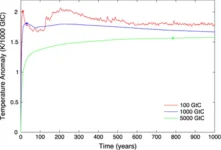- Joined
- May 18, 2019
- Messages
- 19,504
- Reaction score
- 3,684
- Gender
- Undisclosed
- Political Leaning
- Undisclosed
In order to very useful, a global temperature climate model needs to be accurate for at the very least 50 years.
And in order to have much confidence in a 50 year climate model, we would need to see repeated success. Not just one 50 year run.
that is what science is built on, repeated success to build confidence.
Yet we basically have only had one 50 year run with climate modeling.
it seems to me we won't really have a lot of confidence in climate modeling for a couple of hundred years.
Then we can look back and say okay the model didn't just get lucky it's consistently getting it right.
And in order to have much confidence in a 50 year climate model, we would need to see repeated success. Not just one 50 year run.
that is what science is built on, repeated success to build confidence.
Yet we basically have only had one 50 year run with climate modeling.
it seems to me we won't really have a lot of confidence in climate modeling for a couple of hundred years.
Then we can look back and say okay the model didn't just get lucky it's consistently getting it right.

